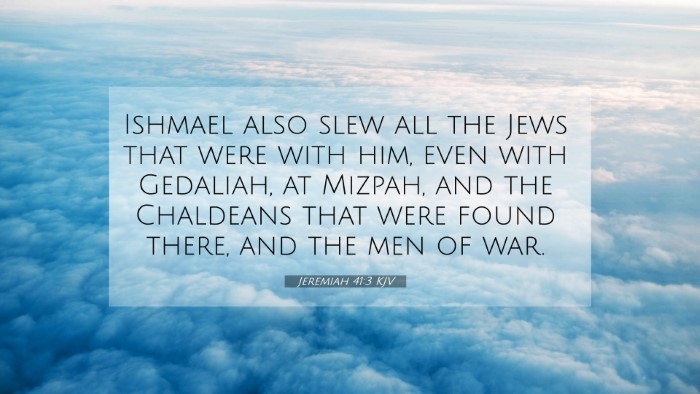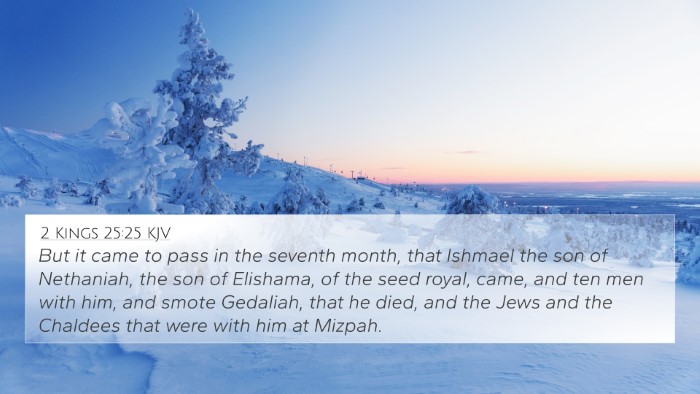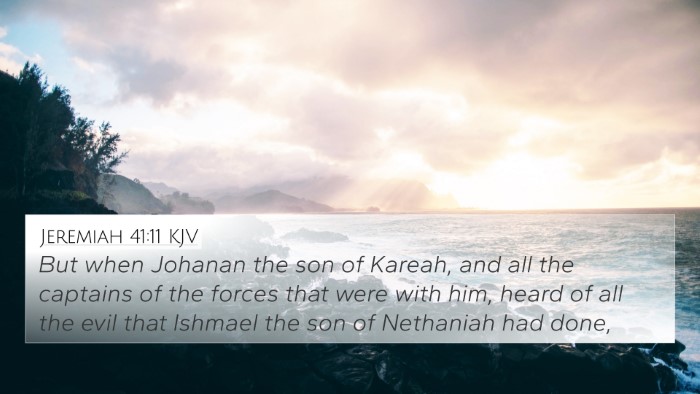Understanding Jeremiah 41:3
Jeremiah 41:3 reads: "And Ishmael the son of Nethaniah carried away captive all the remnant of the people that were in Mizpah, even the king's daughters, and all the people that remained in Mizpah, whom Nebuzar-adan the captain of the guard had committed to Gedaliah the son of Ahikam: and Ishmael the son of Nethaniah slew them, and cast them into the pit."
Summary and Commentaries
This verse is part of the tragic accounts following the destruction of Jerusalem, highlighting the violent actions of Ishmael, who executed a cruel act against those left under Gedaliah's leadership. The insights from various commentaries elucidate the verse's meaning.
-
Matthew Henry's Commentary:
Henry elucidates the recklessness of Ishmael, noting that his actions stemmed from a spirit of hostility and vengeance. The abduction and slaughter of the people signify a deeper moral decay post-exile and reflect on the nature of leadership during chaotic times. Ishmael’s motives are questioned, portraying him as a usurper taking advantage of the people's vulnerability.
-
Albert Barnes' Notes:
Barnes emphasizes the tragedy of innocent lives lost due to the fratricide within the remnants of Israel. The commentary points out the fulfillment of prophecies regarding judgment and the internal strife within the nation, suggesting that Ishmael's actions were not merely personal vendettas but indicative of larger themes of disobedience and divine judgment.
-
Adam Clarke's Commentary:
Clarke provides a historical context, describing the tense atmosphere in Judah after Babylon's conquest. He interprets Ishmael's actions as politically motivated, attempting to reclaim power in a time of confusion. This highlights the perilous nature of leadership without God's guidance, leading to further atrocities and despair among the people.
Thematic Connections
This verse not only illustrates a historical event but also serves as a pivotal point for exploring larger biblical themes such as:
- The consequences of betrayal and murder: Drawing parallels with Cain's murder of Abel (Genesis 4:8).
- The theme of divine judgment: Echoing the destruction of Jerusalem (Lamentations 3:34-36) and God's displeasure with His people's rebellion.
- Leadership and its consequences: Referring to the responsibilities of leaders as seen in Ezekiel 34:1-10.
- The vulnerability of remnants: Corresponding with Matthew 10:16, underscoring the perilous times believers face.
Bible Cross-References
To deepen the understanding of Jeremiah 41:3, it can be cross-referenced with the following verses:
- Jeremiah 40:2-3: Provides context regarding the fall of Jerusalem and the establishment of Gedaliah.
- 2 Kings 25:25: Details the downfall of Jerusalem and Ishmael's role in it.
- Matthew 24:10-12: Reflects on the increase of wickedness and betrayal, similar to Ishmael’s actions.
- Lamentations 3:43-47: Celebrates God’s judgment while mourning the atrocities done to His people.
- Ezekiel 11:8-10: Addresses consequences of betrayal and the fate of the people.
- Micah 7:2: A poetic expression of the societal decay and the loss of virtuous leaders.
- Acts 12:1-2: Discusses the execution of James, showcasing the continuity of persecution in God’s narrative.
- James 4:2: Teaches about the consequences of desires leading to murder - a theme resonant with Ishmael's actions.
Interpreting the Religious Significance
Theologically, this verse invites readers to consider the consequences of human error, rebellion, and the gravity of taking innocent lives. Many believers refer back to these events as cautionary tales, linking this narrative to modern-day implications regarding moral responsibility, leadership integrity, and the call to be vigilant against internal strife within the community of faith.
For those studying scripture, the verse serves as a directive to engage in comparative Bible verse analysis. It reflects the importance of cross-referencing Biblical texts to uncover deeper meanings and thematic connections that span both the Old and New Testaments. The relational dynamics explored in this verse provide fertile ground for understanding the significance of prophecy, fulfillment, and the overarching narrative of redemption woven throughout scripture.
Tools for Bible Cross-Referencing
To aid in the exploration of interconnected scripture, several tools can be employed:
- Bible Concordance: A valuable resource for locating verses based on specific keywords.
- Cross-reference Bible Study Guides: Helpful for identifying thematic links and verse parallels.
- Bible Study Software: Underlines cross-references dynamically for enhanced study experience.
- Bible Chain References: Create connections between verses methodically for comprehensive analysis.
- Online Bible Reference Resources: Platforms that offer tools for connecting various verses contextually.
Conclusion
In summary, Jeremiah 41:3 serves as more than just a historical account; it provides profound insights into human nature, leadership failures, and the overarching themes of judgment and grace in God's narrative. Engaging with this verse through cross-referencing and comparative Bible verse analysis can deepen one's understanding of scripture and its relevance to both historical and contemporary contexts.






